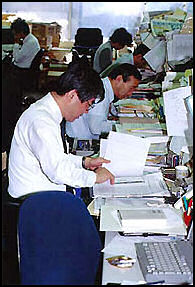JAPANESE SALARYMEN
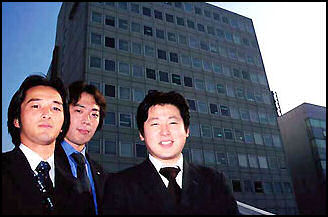 Japanese companies have traditionally hired “dull but dutifully conformist men who accept scripted roles as salarymen.”
Japanese companies have traditionally hired “dull but dutifully conformist men who accept scripted roles as salarymen.”
The backbone of Japan's economy is its salarymen — white collar workers who think nothing of working 16 hour days and six day weeks and fulfilling even the most unreasonable demands of their bosses because they are worried that if they don't it will be viewed as a sign of slackness and they will be overlooked at promotion time. Many salarymen earn no over time for their long hours and some don’t even take vacations.
Salarymen often introduce themselves by their positions and the year the joined the company, saying, "I'm Nakayama of Mitsubishi, I started working in 1982." They also address their superiors and subordinates using different sets of terms.
Many salarymen are referred to as “ojisan”, which literally means uncle but implies an out-of-style older man who is socially inept and smells bad.
Good Websites and Sources: Good Photos at Japan-Photo Archive japan-photo.de ; Wikipedia article Wikipedia ; My Nippon Article mynippon.com ; From a Business Perspective venturejapan.com ; Life of Salaryman culture-at-work.com ;Photos of Drunk Salarymen loneleeplanet.com
Links in this Website: LABOR, UNEMPLOYMENT AND UNIONS IN JAPAN Factsanddetails.com/Japan ;WORKERS AND THEIR COMPANIES IN JAPAN Factsanddetails.com/Japan ; JAPANESE FAMILIES Factsanddetails.com/Japan ; JAPANESE MEN Factsanddetails.com/Japan ; JAPANESE SALARYMEN Factsanddetails.com/Japan ; JAPANESE WOMEN Factsanddetails.com/Japan ; JAPANESE GIRLS AND YOUNG WOMEN Factsanddetails.com/Japan ; JAPANESE MOTHERS Factsanddetails.com/Japan ; JAPANESE WORKING WOMEN Factsanddetails.com/Japan ; JAPANESE CHILDREN Factsanddetails.com/Japan ; JAPANESE TEENAGERS AND YOUNG ADULTS Factsanddetails.com/Japan
Japanese Salaryman Life
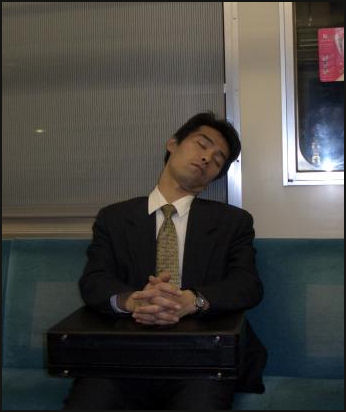 Many salarymen identify themselves by giving their name and the company they work for. April 1st is the time of "Entering-the-Company Ceremonies" in which new employees are welcomed with the speech: "Let's Build the Richness of Our Hearts Through Our Jobs."
Many salarymen identify themselves by giving their name and the company they work for. April 1st is the time of "Entering-the-Company Ceremonies" in which new employees are welcomed with the speech: "Let's Build the Richness of Our Hearts Through Our Jobs."
Many Japanese office workers work "cheek by jowl" at desks jammed against each other in offices with few partitions. Even top executives usually share there their office with someone. The ideal is for a company to succeed through team work rather individual hard work and performance.
Men are often transferred to new jobs at a moment's notice to far away cities, sometimes overseas, and stay there for several years. Men who do this are known as "business bachelors." Many women prefer these long distance marriages. According to one survey by an Osaka matchmaker, 90 percent of the single women in the 30s asked, said they wanted to get married but 30 percent said they wanted to live apart from their husbands.
For all their hard work, salarymen living in the suburbs of Tokyo live in a home half the size as their counterparts in the United States and pay more for food and endure longer commutes. Before heading off on a long commute on the train some Japanese salarymen down a quick breakfast of coffee, two cigarettes, Pepsi and vitamin pills.
Convenient stores do good business supplying salarymen with snacks while they burn the midnight oil. Taxi drivers cruise by offices to pick up workers who miss the last train. Some companies turn down the air conditioning after working hours in the summer to get workers to leave.
See Manga
Book: “The Blue-Eyed Salaryman: From World Traveler to Lifer at Mitsubishi” by Niall Murtagh (Profile Books) is a witty, informative book written by an Irish computer programer who does what the title says.
Salaries, Pay Increases and Promotions in Japan
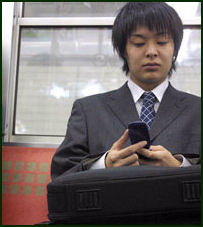
Companies have traditionally not released data on salaries and salarymen have been reluctant to talk about how much they earn. Salarymen generally earn between $40,000 and $100,000. The pay system is designed to increase as employees take on more personal responsibility — marriage, children, buying a house, education.
Salarymen are often given generous bonuses. The average summer bonus in 2009 was ¥363,104, down 9.7 percent from the previous year. The average winter bonus was ¥747,282, 15.9 percent lower than the previous years, the sharpest decline since 1959. See Bonuses, Wages, Labor
Promotions in Japan are usually based on the “nenkojooretsu” ("years-merit-order"), a seniority system which Evelyn Richards of the Washington Post wrote "channels millions of workers in an orderly, predictable way through the corporate tiers. Longevity determines rank, competence is equated with age and experience within a firm counts more than expertise." [Source: Evelyn Richards and Sandra Sugaware Washington Post]
"Members of a 'class' — those who join the company right out of college — are promoted virtually en masse every few years" wrote Richards. "Each spring slips of paper report their nearly uniform raises — with no explanation. After 15 years or so of intense but suppressed rivalry, the class disperses, with some members groomed for the top and others routed to dead-end positions."
The idea of an up-and-coming 35-year-old whiz kid rising above a 45-year-old manager is considered absurd. "If this happens a Japanese businessman told Richards, "Japanese people's mental balance will collapse."
The “bubble generation” — company workers in their late 30s to late 40s who were hired in the Bubble Economy years — are regarded as a burden to Japanese society. They were hired in large numbers compared to workers that came before and after them. This means that today they occupy large numbers of positions with companies but because there are a limited number of managerial posts they have few chances of advancement and are viewed as less motivated than younger workers who have more opportunities for salary increases and advancements and are more willing to switch jobs to get ahead.
Long Hours and Unpaid Overtime in Japan
Salarymen are advised to the be the first one on the office, work harder than everyone else and be the last ones to leave. "Call a Japanese office at 10:00pm and chance are excellent that someone will pick up the," Sandra Sugarawa wrote in the Washington Post. "Around the country, when darkness falls, white collar workers keep right on going. Some work, some doze, some sit around their desks and eat and talk baseball. What they do not do is go home." Even after they leave the office some prefer to sit in their cars than go home. [Source: Sandy Sugawara, Washington Post, April 20, 1997]
According to a government survey 25 percent of male employees in their 30s work 60 or more hours a week. According to a survey by the International Labor Organization 28.1 percent of Japanese workers work 50 or more hours a week, compared to 15.5 percent of British workers, 3.8 percent of Belgian workers and 1.4 percent of Dutch workers.
Japanese salarymen are expected to work late and long hours and not be paid for it. Many work 50 hours of overtime but only get paid for 30. One government worker said, "People praise you based on how many nights you spend at work, not on the work you do." In the Bubble Economy era of the 1980s one popular commercial suggested, the Japanese salaryman was expected to be a “corporate warrior” and “work 24 hours a day.”
Sawa Kurotani of Redlands University wrote in the Daily Yomiuri: “The emphasis on teamwork and loyalty has also had significant effects on day-to-day work practices in Japanese corporations. Unpaid overtime — in which employees do not declare their overtime work and therefore perform additional duties without pay — has been a routine practice which workers often understood as necessary and obligatory at times of high work demand even if their supervisors do not speak a word about it.”
“The majority of Japanese workers hesitate to leave work at the official closing time of 5 p.m. if anyone else on their team or section is staying behind...The line between work and leisure is often blurred — or even nonexistent — as many salarymen social network is almost exclusively based in their world of work. Thus after work social activities and weekend outing with co-workers , bosses and clients cut further into already diminished personal time.”
Stricter rules about overtime pay are being put on the books. The Labor Standard Law was revised in December 2008 to raise the rate for overtime work to 50 percent or more of regular pay from the 25 percent or more.
Goofing Off and Long Hours
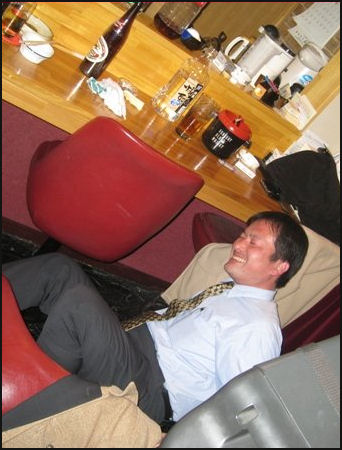
drunk salaryman Some companies have come to believe that the long hours may actually be counter-productive. Some salarymen spend more time finishing a task because they know they are going to be in the office for a long time. British economist Andrew Shipley of Schroders merchant banking group told Sugarawa: "Japanese are working hard, but are they doing the stuff they are supposed to be doing”. I would argue they are not."
A lot of the time salary men spent in their offices is not spent working. Describing the Ministry of Finance after 10:00pm, Sugarawa wrote: "Lights were blazing all over the building. In some rooms men sat hunched over their desks, sleeves rolled up, churning through documents. In others, groups of colleagues chatted, laughed and drank sodas. Outside each office were stacks of dirty plates, with bits of take-out Chinese food and sushi scattered about."
Salarymen often spend long hours in the office chatting and watching television to offer "companionate overtime," or moral support, to coworkers that actually had work to do. Unlike American white collar workers who aspire to achieve a goal or complete a task, Japanese salarymen put in long hours, kiss-ass fashion, to look good in their bosses eyes and to be available if their services are suddenly needed at 9:00pm.
In the mid 2000s attention began shifting to “work-life balance” and reducing the amount of time that couple spent working so they could have more time to raise children and help increase the birth rate. Some companies have even introduced "no overtime days" to force workers to go home and spend times with families. More and more young company workers are pursuing other things in the “after five” lifestyle.
Long Commutes in Japan
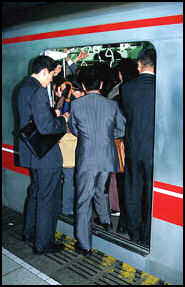
The average Tokyo salaryman has been described as "commuter slave of commuter hell" spending an average of hours each days and years of his life commuting to and from work on trains where there isn't even enough space to read. One magazine wrote an article about a salaryman with single worst commute to Tokyo — three and half hours each way.
"Despite the indignity and physical agony, commuters suffer in silence," one newspaper wrote. "I carry a radio sometimes and listen to the news or music,” one commuter lamented. “I'm alone I don't know anyone on the train. Everyone is like that."
Photographer Peter Menzel lived for a week with a salary man who "wakes up at the last possible second...and walks out the door a 7:28 sharp. He times himself with a little clock on the TV screen. Then he walks to the station, arriving 45 seconds before the train (which is exactly on time, this being Japan).
Employees get commuting expenses. Salarymen who can't make the train often stay at a company dormitory or stay in business hotels or capsule hotels. In recent years people have been moving to highrises in the city rather than houses in the suburbs. One reason for this is that many people are tired of long commutes.
Salaryman After-Hours Activities
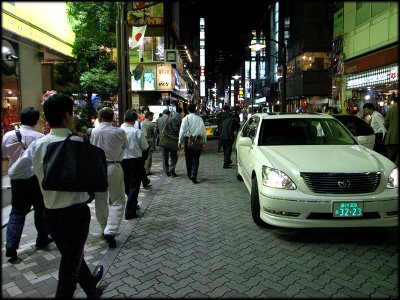
Entertainment area
frequented by salarymen Salarymen usually drink and eat with colleagues after work twice a week or so. The bar districts of Japan's cities are filled with whiskey-drinking, karaoke-singing businessmen complaining about their bosses, their long commutes and their wives. The last train to the suburbs is often full of "a weary mass of men in navy blue suits and some students pressed against each other in pained, soporific poses, the air redolent of alcohol and occasional curses when someone struggles on or off."
Salarymen are also required to participate in weekend activities such golf and hot spring visits with clients or coworkers. Some have to take tests or attend business training "boot camps" in which they have to stand in cold water and are deprived of sleep.
The practice of employees drinking and going out with their boss is reportedly beginning to die out. One manager at a securities firm told Newsweek, "Young men in departments seem to think that going out for drinks with me is overtime work. They tell me straight away that away that they've got other plans." Weekend company outings are also falling out of favor. "Why did I have to spend my weekend with my bosses and colleagues at a hot spring," one worker told Newsweek. "My colleagues felt the same way, so our department decided to stop that tradition."
The media sometimes portrays salarymen patronizing S-and-M clubs and molesting women on subways. The film director Nagisa Oshima feels that there is latent homosexuality at the root of salarymen behavior. He once said, "Why do you think the Japanese businessmen stays in the office for so long? Don't tell me its out of loyalty to the company. He’s there because consciously or unconsciously, he want to be with other men."
Salaryman Nobel Prize Winner
One of the most unlikely Japanese celebrities of the early 2000s was Koichi Tanaka, a seemingly ordinary salaryman engineer: shy, nerdy and retiring, preferring the solitude of the laboratory to the world of people. But one thing made him different: he won a Nobel Prize.
Tanaka graduated from Tohuku University. At the time he won the award he was an employee of the Kyoto-based Shimadzu Corporation, He won the prize with American John Fenn and Swiss Kurt Wuethrich for his work developing an ionization technique using laser desorption for mass spectrometry of macromolecules. He was first employee of a Japanese company to win the award and the first recipient of the chemistry prize with only a bachelor’s degree.
Tanaka was embraced by the media and the public. For several months he was in the news almost every day. Television cameras followed him as he expressed how nervous he was about giving a speech in English and remembering the correct protocol when he received his award. The more awkward and bashful he was the more the public seemed to embrace him.
Tanaka’s work in mass spectrography has enabled researchers to make three-dimensional images of protein molecules in cells. This has allowed them to identify the proteins and better understand how they work. The discovery has greatly helped scientist study diseases and develop new medicines. Among other things mass spectrography has led to the development of sophisticated doping tests for athletes.

Salarymen Stress
According to the Japanese Cultural Affairs Ministry “stress” is the most recognized and frequently used loan word in Japan. Other widely-used and -understood words include “recycle,” volunteer” and “website.” The determination was made asking people whether or not they had heard of a given word. Total of 98.5 percent had heard of “stress.”
According to a in the late 1990s, 68 percent of the respondents said the felt worried and anxious, compared to 37 percent in 1990, and 74 percent experienced irritability and anger, compared to 46 percent on 1990. About 425,000 people were treated for stress-related mental disorders in 2000.
Salarymen are regarded as one of the most stressed out groups in Japan. Their stress comes in three forms: 1) the day-to-day stress of overwork, long commutes, long hours and lack of sleep; 2) depression and anxiety over being skipped over for a promotion or losing his job and be denied a pension expected as a reward for hard work; and 3) loss of status and respect that comes with being denied a promotion or being laid off.
Because of long commutes and long working hours many salarymen get only around four hours of sleep a night. During the lunch breaks some park their cars somewhere and take a nap. One psychologist told the Los Angeles Times, "Being exhausted is considered a virtue." According to one survey 59 percent of Japanese said they were tired, compared only 15 to 30 percent respectively in Europe and the United States.
Salarymen stress sometimes manifests itself in outbursts and violence. So many drunken salarymen in their 50s have verbally abused and assaulted people on trains and train platform extra guards have been hired by train companies to patrol the stations. One salaryman told the Los Angeles Times, "Sometimes I really feel like slugging someone."
Ministry of Health and Welfare figures reveal a fourfold increase in the general rate of ill health in the community between 1955 and 1995, with high blood pressure and nervous disorders showing even greater increases.
The reformist politician Ichiro Ozawa described Japan as "an ostensibly high-income society with a meager lifestyle" in which “people have been relegated to the status of cogs in a wheel."
Karoshi (Death from Overwork)
It is believed that every year around 10,000 men die of “ karoshi” , a word that has come to mean "death by over work." A counselor that ran a mental health clinic said that typical karoshi victim works 90 hours a week, never takes a Saturday or Sunday off, is pressured by his boss to perform and doesn't get enough sleep due to long commutes.
Karoshi first surfaced as a major social problem in Japan in the mid 1980s. According to Gavan McCormack the author of “The Emptiness of Japanese Affluence”, karoshi is now a "widely accepted phenomenon." Some believe the 10,000 figure is too low and the true figure could be 30,000 and 50,000 when one figures in all the strokes, heart attacks and illnesses that are related to overwork.
In the 1990s hospitals began reporting sharp increases in the number of patients suffering from depression due to overwork, anxiety or exhaustion. Many are middle aged salarymen who work their butts off but are worried about losing their jobs. Some overworked men who have high blood pressure and other health problems refuse to seek medical help because they say they don't have the time.
Around 2,000 suicides a year are attributed to work problems. Kurotani wrote in the Daily Yomiuri that after the collapse of the bubble economy “different sources of stress began to affect corporate workers...Overworked, alienated and stressed beyond their limit, more and more Japanese workers in mid-career began choosing death as their only way out.”
In recent years the suicide rates of men at the 30s to early 50s — traditionally a group that had a very low suicide rate — has risen dramatically The suicides often come as a shock to family members who had no idea things were so bad. Some men chose to commit suicide by leaping from a train platform in front of oncoming train during the height of the evening rush hour, a move that often gets public attention.
Examples of Karoshi
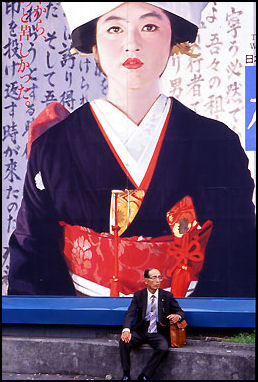
In 2000, the family of a 24-year-old man who committed suicide after putting 80-hour-a week work weeks for an advertising firm sued the firm and was awarded damages of $1 million. In February 2009, a court in Hokkaido awarded $1 million in an overwork suicide case involving a 33-year-old employee who killed himself in 2005.
A manager at McDonald’s who worked an average of 80 hours a week won a lawsuit against his employer, ordering McDonald’s to pay him ¥7.5 million in unpaid overtime. The company argued that because the man held a management position he was not entitled to overtime.
Similar suits have been filed and won by managers of bookstores, clothing shops and moneylenders. A manger in his 20s at another restaurant routinely worked 20 hour days and had only two days off a month. He served customers, prepared dishes and supervised 10 part timers. He often did paperwork at home, sometimes staying up until dawn.
Among those that courts have ruled died of over work are a businessman who was away from home on overseas business trips for 180 days a year; a woman who worked part-time at two publishing firms, putting in 147 hours of over time a month.
Blue collar workers are also affected. Hiroko Uchino collapsed and died at the age of 30 on the floor of the Toyota factory where he worked. He had put in 106 hours of overtime in the previous 30 days. Uchino’s wife told the Times of London, “Everyone talks of the wonderful profit figures of Toyota, but look at the lives of the people who make it so strong. The way of life of that this company demands...there is no humanity in it. What frightens me is that the world will see Toyota, think that its system works well and copy it.”
Hikikomori
See Social Problems
Stress Reduction in Japan
Salary men reduce their stress by going out drinking whenever the can, getting massages, visiting sex clubs, buying massaging chairs, visiting hot springs, playing pachinko. Many find it difficult to relax in their noisy, cramped small apartments.
A multi-million dollar industry has grown up around stress reduction. Stress-relieving salons offer things like $10, 10-minute shoulder massages, reflexology lessons and visits to isolation tanks with soothing music and psychedelic lights. Among the stress-relief products on the market are aromatherapy lamps, stress-relieving CDs, herbal teas, sleeping pills and relaxation aids such as $150 robot jellyfish and $11,000 virtual fish tanks.
In an effort to get salarymen to loosen up a bit, some companies began sponsoring "casual Fridays" in the mid 1990s. Now some even have "casual every day." In the 1990s the Despair Drink Pub allowed salarymen to release stress by throwing plates against a wall for $1.70 a plate and break furniture.
Stress-Age gum use' the body's pH to indicate health. Users chew it for three minutes. If the gum is pink you're in good health. If its green, you're sick.
Japanese Stress Reduction Machines
To relieve stress some Japanese go 'mind gyms' where they relax in special coffin size cubicals and listen to music and wear goggles with pulsing lights. Some stress relief salons feature aromatherapy capsules that offers scents, vibrations, relaxing music, psychedelic lights and heaters that can raise the temperatures to as high as 79̊C. A 30 minute stay in these capsules cost around $30.
Researchers at Matsushita Electric Works have developed a virtual-reality, massage armchair with built in speakers and a headset that shows three-dimensional images of misty mountains, scenic valleys and beautiful sunsets. The vibrations and movements of the chair respond to signals from a heart-beat monitor attached to the users ears. The company spent $2 million developing the chair and expects stressed out salarymen to be its biggest customers.
Stressed Japanese securities traders often unwind by sticking their head inside music machines which look like giant hair dryers.
In Tokyo a number of exhausted company workers are seeking relief with IVs. The Yebisu Garden Place Clinic in Ebisu, Tokyo offers a number of different IVs including ones that promise to help workers overcome fatigue and ones that claim to help users feel more healthy and attractive.
Haruka Takahashu of the Yomiuri Shimbun went to Ebibsu to try one of the treatments. After a few questions about her physical condition a nurse asked here, “Which menu item would you like to have today.” A basic drip of 50cc glucose solution cost ¥2,000 and is supplemented with additional treatments that cost extra such as the “comprehensive beauty care” for ¥3.500, “fatigue recovery” and “cosmetic whitener,” each for ¥3,000, and “energizing” and “detoxification” treatment for ¥2,500 each.
“I picked the “comprehensive beauty care,” which is designed to generate collagen and get rid of pimples...Upon my request, the nurse took an ampule and blended it with basic drip. The transparent liquid instantly turned a vivid orange...When the needle was stuck into my vein, the orange-colored fluid started dripping through the tube rhythmically...before long, I noticed a garlicky taste gradually spreading in my mouth...”Don’t worry — it’s caused by a Vitamin B group substance,” the nurse said...It took about 10 minutes until the drip was completed. When I looked into the mirror, my skin seemed fresher than before I received the drip.”
Changes for Salary Men and Salary Men Drop Outs
See Changes in Japanese Labor
Many salarymen who have decided they have had enough of long hours and stress have joined “donkame” (stupid turtle) turtles clubs that have only two rules: First, the members must earn at least $800 a month to help pay for rent and utility bills and, second, they must sell “takoyaki” (dumplings made with octopus legs) twice a week. The members live in comfortable homes outside of Tokyo and fill their time pursing hobbies and enjoying life.
Image Sources: 1) Tokyo Pictures 2) Japab Visitor, 3) Niel Duckett, 4) Ray Kinnane 5) Andrew Gray, Photosensibilities , Others, japan-photo.de japan-photo.de
Text Sources: New York Times, Washington Post, Los Angeles Times, Daily Yomiuri, Times of London, Japan National Tourist Organization (JNTO), National Geographic, The New Yorker, Time, Newsweek, Reuters, AP, Lonely Planet Guides, Compton’s Encyclopedia and various books and other publications.
Last updated March 2010

